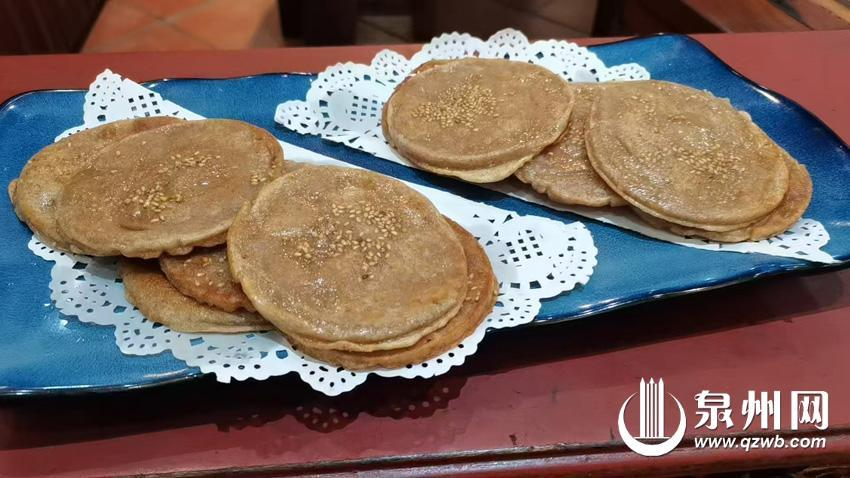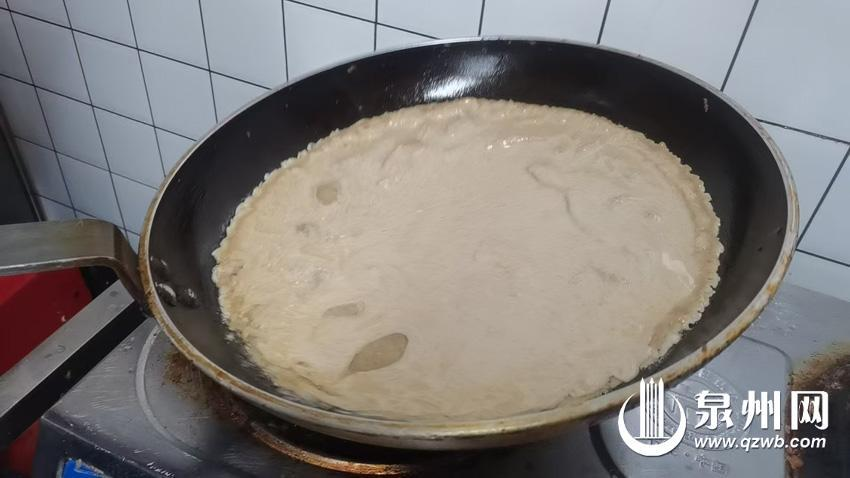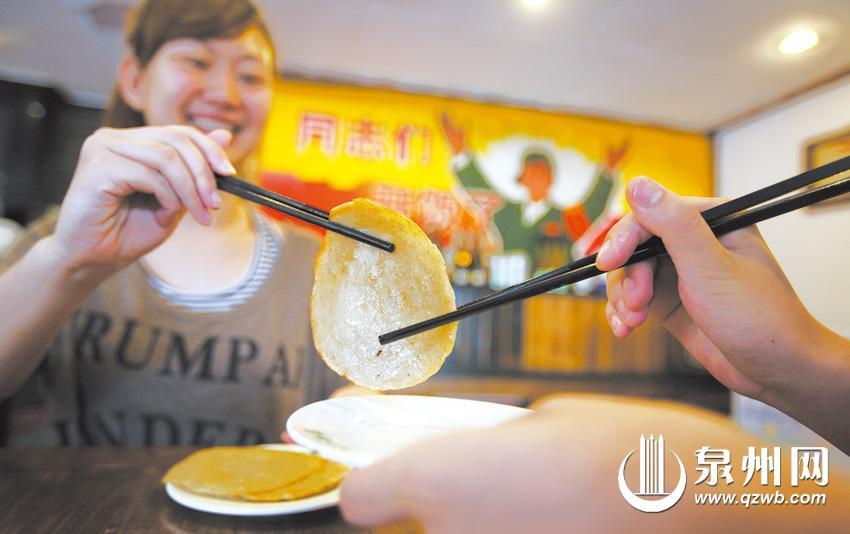- Guide
- Flavors
By Zhang Junlin, Multimedia Reporter
When it comes to Quanzhou's Dragon Boat Festival delicacies, zongzi (sticky rice dumplings) might be the most famous, but there's another lesser-known treat with a rich heritage: Jian Bing. Originating from the imperial kitchens, this round pancake carries ancient wishes for a good harvest and fine weather, earning it the nickname "Sky-Patching Cake" among locals.

Jian Bing filled with sesame and other ingredients (Photo courtesy of Old Quanzhou)

Pouring batter into a pan and gently frying until fully cooked (Photo courtesy of Old Quanzhou)

The enticing aroma of freshly cooked Jian Bing (File photo from Quanzhou Evening News)
A Culinary Tradition Tied to the Weather
Like many traditional Chinese foods, Quanzhou's Jian Bing holds deep symbolic meaning. Yan Chengli, a local folk expert from Jinjiang, explains that Jian Bing originally emerged from the imperial kitchens under the name "Lu Dui" (禄堆). In ancient times, it was a refined dish often reserved for court banquets and royal celebrations. Over the centuries, this court delicacy gradually found its way into everyday life among ordinary people.
According to local folklore in Quanzhou and Jinjiang, Jian Bing is linked to a charming legend. The fifth lunar month, which coincides with the Dragon Boat Festival, marks the beginning of the rainy season in southern China. Locals believed that the constant drizzle and overcast skies were caused by leaks left behind when the goddess Nüwa patched the sky. For farmers who relied on favorable weather for their crops, excessive rain could mean disaster. To symbolically "patch the sky" and wish for sunshine and a good harvest, people would make round pancakes—Jian Bing—during the Dragon Boat Festival as a gesture of hope for clear skies and abundant crops.
Hong Hong, a local cultural ambassador, adds that this time of year also marks the end of the wheat harvest. Families would use freshly milled wheat flour, mixed with sugar and other ingredients, to make these round pancakes. A local proverb, "When it rains, grab some oil and fry Jian Bing," reflects how closely this culinary custom is tied to the season's weather. Additionally, in Fujian's humid climate, these soft, pan-fried pancakes help balance the body's healthy diet, as expressed in another local saying: "In the fifth month, eat Jian Bing and steamed dumplings, and you'll stay healthy."
From Ritual Offering to Everyday Treat
Traditionally, Jian Bing was made with mature wheat flour. In earlier times, when food was scarce, this treat was considered a luxury reserved for special occasions. During ancestral worship on the Dragon Boat Festival, Jian Bing was often presented as an offering on the altar, symbolizing respect and remembrance.
Today, with living standards much improved, Jian Bing has become a beloved everyday snack in Quanzhou. According to Hong Hong, it's now enjoyed year-round in street stalls and restaurants alike. The recipe has also evolved: while the traditional wheat-flour version remains popular, people now experiment with rice flour, lard-based pancakes, and even versions incorporating sweet potato starch, oysters, and spring onions. The flavors range from sweet to savory.
Sweet Jian Bing is made by blending wheat flour, brown sugar, and water, then frying the mixture until it's soft, chewy, and fragrant with a rich brown sugar aroma. Savory versions often combine wheat flour with bean sprouts, chives, tiny shrimp, or oysters, creating a layered flavor that's both refreshing and umami-rich—a unique culinary experience with every bite.
Simple Ingredients, Rich Flavors
Of the many varieties, the most common is sweet wheat-bran Jian Bing. The process is simple: prepare 500 grams of wheat bran flour, 100 grams of brown sugar, and 30 grams of cooked lard. Slowly add the flour to a mixing bowl, incorporate the sugar, and gradually stir in warm water until a smooth batter forms. Heat a pan with a small amount of lard, then swirl it to coat the surface and prevent sticking, adding a delightful aroma in the process. Pour the batter into the pan, flatten it with a spatula, and cook gently over low heat, flipping occasionally to ensure even cooking. As the pancake turns golden and aromatic, it's ready to serve.
Fresh from the pan, sweet wheat-bran Jian Bing is warm, soft, and subtly sweet with the richness of brown sugar—neither too heavy nor too light. Paired with a cup of fragrant tea, it's a delight for the senses. The tea not only balances the sweetness but also enhances the experience, allowing the rich aroma of traditional flavors to unfold, making each bite a celebration of heritage.
